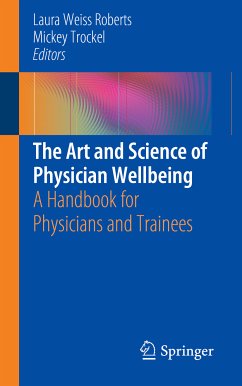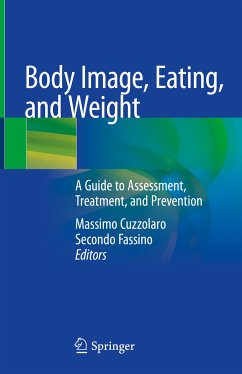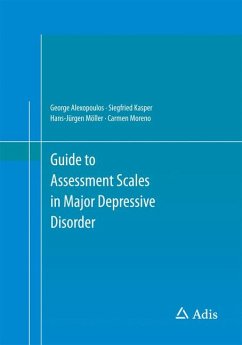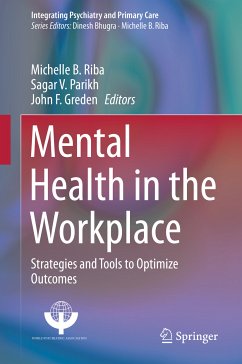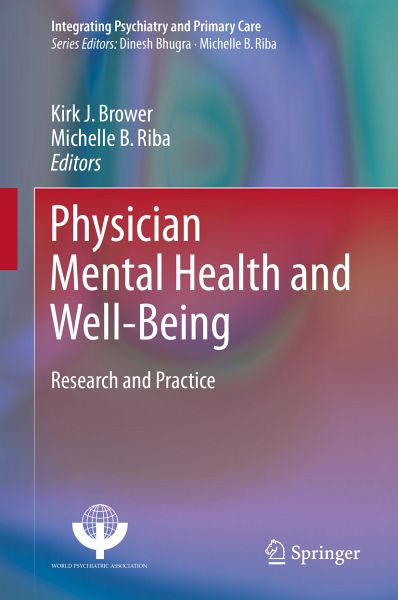
Physician Mental Health and Well-Being (eBook, PDF)
Research and Practice
Redaktion: Brower, Kirk J.; Riba, Michelle B.
Versandkostenfrei!
Sofort per Download lieferbar
52,95 €
inkl. MwSt.
Weitere Ausgaben:

PAYBACK Punkte
26 °P sammeln!
This book explores the important topic of mental health and related problems among physicians, including trainees. The all-too-common human response of "suffering in silence" and refusing to seek help for professional and personal issues has ramifications for physicians who work in safety-sensitive positions, where clear-headed judgment and proper action can save lives. Problems covered include burnout, disruptive and unprofessional behaviors, impaired performance, traumatic stress, addiction, depression and other mood disorders, and suicide.The authors of this work include psychologists, psyc...
This book explores the important topic of mental health and related problems among physicians, including trainees. The all-too-common human response of "suffering in silence" and refusing to seek help for professional and personal issues has ramifications for physicians who work in safety-sensitive positions, where clear-headed judgment and proper action can save lives. Problems covered include burnout, disruptive and unprofessional behaviors, impaired performance, traumatic stress, addiction, depression and other mood disorders, and suicide.
The authors of this work include psychologists, psychiatrists, and other physicians who diagnose and treat a range of patients with stress-related syndromes. Among their patients are physicians who benefit greatly from education, support, coaching, and treatment.
The book's content is organized into three parts with interconnecting themes. Part I focuses on symptoms and how physicians' problems manifest at the workplace. Part II discusses the disorders underlying the manifesting symptoms. Part III focuses on interventions at both the individual and organizational levels. The major themes investigated throughout the book are developmental aspects; mental health and wellbeing as a continuum; and the multifactorial contributions of individual, interpersonal, organizational, and cultural elements to physician health.
This book is intended for anyone who works with, provides support to, or professionally treats distressed physicians. It is also intended for healthcare leaders and organizations that are motivated to improve the experience of providing care and to change the culture of silence, such that seeking help and counsel become normal activities while minimizing stigma. By writing this book, the authors aim to outline effective pathways to well-being and a healthy work-life balance among physicians, so that they may provide optimal and safe care to their patients.
The authors of this work include psychologists, psychiatrists, and other physicians who diagnose and treat a range of patients with stress-related syndromes. Among their patients are physicians who benefit greatly from education, support, coaching, and treatment.
The book's content is organized into three parts with interconnecting themes. Part I focuses on symptoms and how physicians' problems manifest at the workplace. Part II discusses the disorders underlying the manifesting symptoms. Part III focuses on interventions at both the individual and organizational levels. The major themes investigated throughout the book are developmental aspects; mental health and wellbeing as a continuum; and the multifactorial contributions of individual, interpersonal, organizational, and cultural elements to physician health.
This book is intended for anyone who works with, provides support to, or professionally treats distressed physicians. It is also intended for healthcare leaders and organizations that are motivated to improve the experience of providing care and to change the culture of silence, such that seeking help and counsel become normal activities while minimizing stigma. By writing this book, the authors aim to outline effective pathways to well-being and a healthy work-life balance among physicians, so that they may provide optimal and safe care to their patients.
Dieser Download kann aus rechtlichen Gründen nur mit Rechnungsadresse in A, B, BG, CY, CZ, D, DK, EW, E, FIN, F, GR, HR, H, IRL, I, LT, L, LR, M, NL, PL, P, R, S, SLO, SK ausgeliefert werden.



